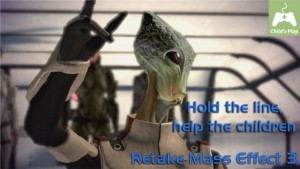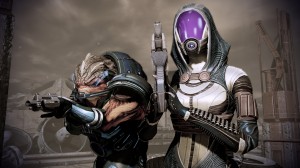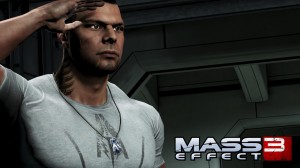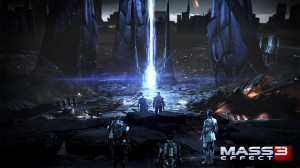Mass Effect 3 – Too Big For Its Britches
- Updated: 21st Mar, 2012
 If you have any interest in gaming at all, you’ve probably heard something about the controversy surrounding the ending to Mass Effect 3. In short, a collection of gamers are very unhappy and very vocal about the conclusion to the series. A group have even started a petition to change the ending. In response to accusations of entitlement, they have raised over $75,000 for the Child’s Play gaming charity. Now BioWare have responded with talk of “game content initiatives”, whatever that means.
If you have any interest in gaming at all, you’ve probably heard something about the controversy surrounding the ending to Mass Effect 3. In short, a collection of gamers are very unhappy and very vocal about the conclusion to the series. A group have even started a petition to change the ending. In response to accusations of entitlement, they have raised over $75,000 for the Child’s Play gaming charity. Now BioWare have responded with talk of “game content initiatives”, whatever that means.
I’ve refrained from commenting on any of the debate this until I’d actually seen the ending for myself. If you haven’t yet seen it, be warned that there will be spoilers in this post for all three Mass Effect games.
Over the past couple of weeks, my Twitter feed has been a steady trickle of people saying “Just cried at #ME3. Again” or “Oh my God, Tali” or most memorably:
I’ve reached a decision in this game that is too hard for me to make.
I didn’t think it was possible for Mass Effect to feature decisions TOO BIG but, indeed, that’s exactly what it has done.
I am seriously unable to cope with this. Anyone who thinks games are all about agency is an asshole right now.
And that’s a testament to how much people care about the choices they make in these games. I never reached this point in Mass Effect 3. I rarely cry at any kind of media but the first game to actually wring tears from my cold, dead soul was the Overlord add-on to Mass Effect 2. Seeing what Cerberus had done to David Archer in the name of research and listening to him ask for help was just horrifying.
 Another rare moment of empathy with game characters was in the first game. Choosing to sacrifice either kick-ass female soldier Ashley or my own boyfriend Kaiden on Virmire was the first moment in any game where I actually had to stop and think about what to do.
Another rare moment of empathy with game characters was in the first game. Choosing to sacrifice either kick-ass female soldier Ashley or my own boyfriend Kaiden on Virmire was the first moment in any game where I actually had to stop and think about what to do.
Of course, realising that I’d be giving up the Paramour achievement ruined the moment somewhat, but the fact that I cared enough about the characters to weigh them on their own merits was a breakthrough moment for me.
Mass Effect 2’s ending took that decision and multiplied it tenfold. You spent the game saving worlds and picking up companions along the way. Over time, each of them would approach you separately and ask for help. Each time, I said yes and I always tried to do the right thing by them. I knew that gaining their loyalty would be important but as each mission progressed and each loyalty tick-box was ticked, I found myself becoming more and more loyal to them.
 I empathised with the plight of the geth race. I felt outrage at the atrocity that was committed against Wrex’s Krogan people with the genophage yet I understood the desperation that the Turians and Salarians faced in making that decision when their worlds were on the brink of destruction.
I empathised with the plight of the geth race. I felt outrage at the atrocity that was committed against Wrex’s Krogan people with the genophage yet I understood the desperation that the Turians and Salarians faced in making that decision when their worlds were on the brink of destruction.
During the suicide mission finale – choosing who to send to their potential death in the crawlspaces, choosing who to lead the secondary fire team, choosing who I would trust to hold a biotic shield over me through a corridor of burning death – these were all important decisions. My actions throughout the game led to a series of options with immediate consequences.
In Mass Effect 3 I never had trouble with my decisions, because my feelings toward each character had already been set. I couldn’t destroy the entire Geth race without at least trying to reason with the Quarians. Having seen Wrex listen to reason and become a leader of his people, I was always going to try and save the Krogan race and let the rest of the universe figure out how to deal with them down the line. It might piss off the Turians, but I don’t care about them. I care about Garrus.
For me, this is the main let-down of Mass Effect 3 and its conclusion. Throughout the game, instead of strengthening my relationships with those who survived or forging ties with new companions, BioWare chose to have me unite (or destroy) entire races. It all plays out on a much grander scale and in doing so, the third game loses those intimate touches of character and that decision feedback that felt so strong in the second.
 Sure, you’re reunited with basically everyone whose lives you’ve touched over the previous two games but meeting David Archer again felt so superficial. Adventuring with Wrex was nice but he could have just as easily been Grunt or any other Krogan. I talked to my people on the ship between missions. I had coffee with Kaiden on the Citadel and okay, yes, I did help Tali liberate Rannoch from the Geth. But I already know Tali.
Sure, you’re reunited with basically everyone whose lives you’ve touched over the previous two games but meeting David Archer again felt so superficial. Adventuring with Wrex was nice but he could have just as easily been Grunt or any other Krogan. I talked to my people on the ship between missions. I had coffee with Kaiden on the Citadel and okay, yes, I did help Tali liberate Rannoch from the Geth. But I already know Tali.
What about James Vega? Alliance soldier and prison guard, not that you’d know it if you hadn’t read the comic Mass Effect: Conviction. I talked to Vega between every mission, yet our most meaningful interaction was a scene in a bar about inspiring some grunts which could have come out of any war film made in the past 60 years. I never felt the sense of shame and responsibility that I did when I got Tali excommunicated from the Quarian Fleet. Nothing came close to the elation mixed with guilt when I was reunited with Garrus and learned that our travels together had turned him into a vigilante, no longer satisfied with upholding the law.
Frankly, I couldn’t care less about James Vega. I had bit of a chat with pilot Steve Cortez about his dead husband but that’s not exactly on a par with talking down a raging Krogan Battlemaster after you’ve destroyed the only hope for his people.
In stark contrast to the immediacy and desperation of the suicide mission, Mass Effect 3’s ending was a damp squib. A large, green, galaxy-changing squib, but a squib nonetheless. Throughout BioWare games the main story is always predetermined. You will confront Saren on the Citadel. You will destroy a giant humanoid in the Collector Base. You will unite the Crucible with the Catalyst.
What’s changed between this and the previous game is the pacing. The ME2 suicide mission was a series of intense and significant moments interspersed with firefights and coming to a crescendo with the biggest boss ever seen in the series. The ME3 final mission is… a million miles from that. Taken as a whole, the final mission runs in contradiction to the design of the entire series.
You run around killing the same Reaper-controlled fodder that you’ve already killed a hundred times (more if you played multiplayer). You spent 10 minutes in the middle saying meaningful goodbyes to some of your crew but apparently you don’t care enough about Wrex to actually look him in the eye. They’ve taken away the manual save option, so if you walk through the wrong door without saying goodbye to Garrus, the autosave means that you have to replay the entire mission from scratch.
 Then you fight yet more Reaper-minions only this time they actually continue to spawn until you fight your way back to the missile control truck and trigger a cut-scene. Correct me if I’m wrong but this is the first and only time in the game where you have COD-style infinite spawning, is it not?
Then you fight yet more Reaper-minions only this time they actually continue to spawn until you fight your way back to the missile control truck and trigger a cut-scene. Correct me if I’m wrong but this is the first and only time in the game where you have COD-style infinite spawning, is it not?
The one real decision that you get to make in that final mission – who to bring as your final squad – means nothing at all. For a while I thought it was sad that my crew had been vaporised when we were all hit by a Reaper beam but nope. Somehow EDI managed to survive and get herself back on the Normandy. I guess maybe I was unconscious for a really long time.
Finally, you reach your target and make it back into the Citadel. What’s your reward? Limping along a corridor to have an argument with your former boss who is obviously a nutcase and then being lectured by a ghost.
I am being somewhat facetious of course. There’s rather more story to it than that and my concluding choice was very much satisfactory but to have the entire galactic war reduced to the meddling of a literal deus ex machina? To follow up the suicide mission’s superb balance of combat and relationship with a bunch of repetitive firefights and some speeches? It’s no wonder people are disappointed.
As we reported earlier, BioWare published an message addressing the issue from one of BioWare’s co-founders, Ray Muzyka:
…Exec Producer Casey Hudson and the team are hard at work on a number of game content initiatives that will help answer the questions, providing more clarity for those seeking further closure to their journey. You’ll hear more on this in April. We’re working hard to maintain the right balance between the artistic integrity of the original story while addressing the fan feedback we’ve received. This is in addition to our existing plan to continue providing new Mass Effect content and new full games, so rest assured that your journey in the Mass Effect universe can, and will, continue.
According to the Twitter knee-jerk reaction, this means that BioWare will be changing the ending. I disagree. There was so much left unsaid and so many stories to finish that they could milk this ending with extra content for months. Both BioWare co-founders Muzyka and Zeshuck have championed the “Games As Art” position for a long time, even making this the topic of the 2011 BAFTA Annual Video Games Lecture. Watch the video and you’ll see that feedback and integrity are key to their philosophy. Nothing in the post or the quote above talks about changing the ending. Rather, it seems to me that they intend to bring clarity and closure to those fans who still have questions (which is admittedly, all of us). There’s plenty of room in DLC, comics and novels to answer all the questions and I’m confident that BioWare will support the team’s vision for Mass Effect 3.
Having crucial story elements pushed into other media? That’s a whole different issue.

4 Comments